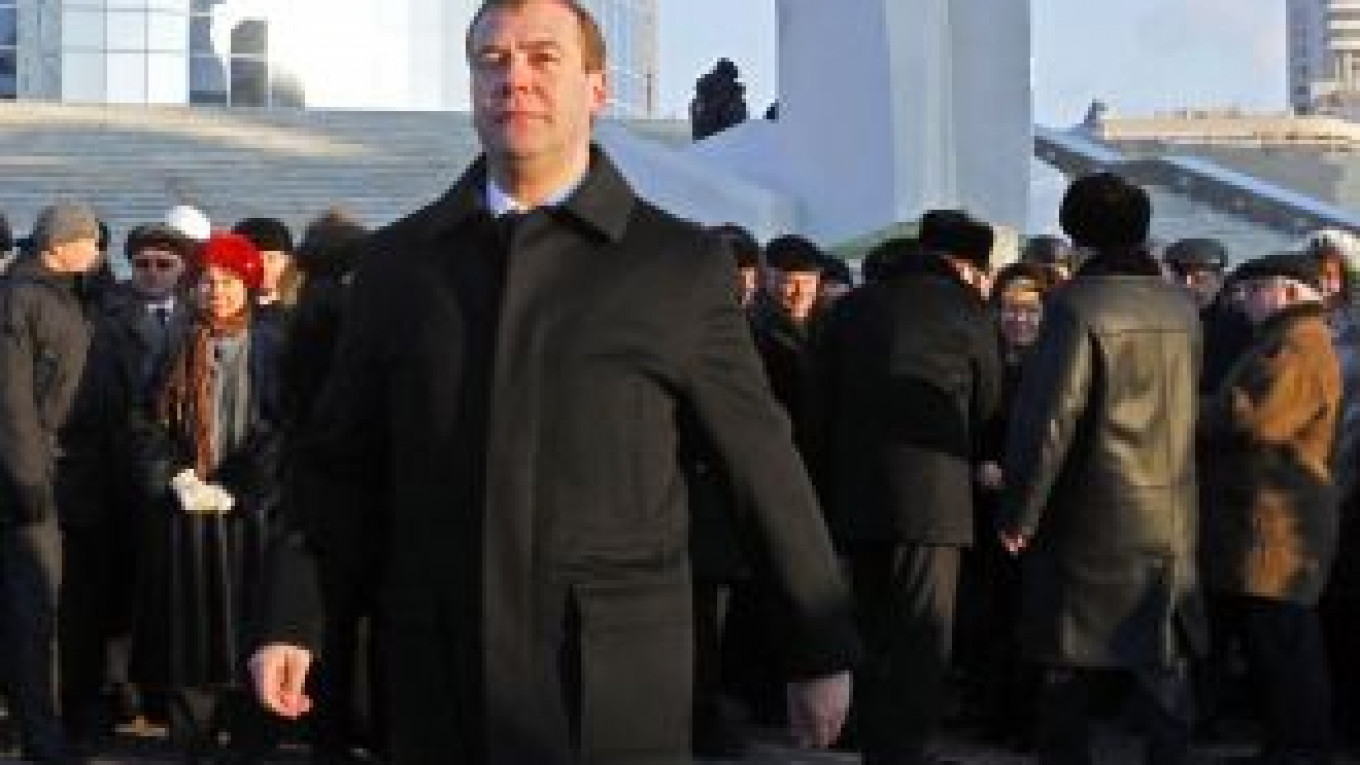President Dmitry Medvedev paid tribute to late President Boris Yeltsin on what would have been his 80th birthday Tuesday by enlarging the Kremlin's human rights council and ordering it to examine the cases of Sergei Magnitsky and Mikhail Khodorkovsky.
It was unclear whether the changes, announced at the unveiling of a Yeltsin monument in Yekaterinburg, capital of Yeltsin's native Sverdlovsk region, would add clout to the previously largely toothless council.
"I hope this will increase the efficiency of the activities of all who are present here," Medvedev said at a council meeting in Yekaterinburg, the Kremlin web site reported.
As Medvedev signed a decree outlining the changes, he said, "I am doing this right now, the way Yeltsin really liked to do things." Yeltsin was well known for making surprising and spontaneous decisions.
Under the decree, the council will swell from 34 members to 40, and it will be entitled to draft proposals to transfer the functions of state agencies to civil society institutes.
The council also was assigned vague tasks of "contributing" to Russia's "humanization" and "modernization," and "making proposals to create favorable conditions for the development of civil society institutes."
Council member Yelena Panfilova said Medvedev asked the council “to make expert conclusions on high-profile cases: that of Magnitsky, Khodorkovsky and others."
Hermitage Capital lawyer Sergei Magnitsky died in 2009 of an untreated illness in a pretrial detention center where he was jailed after accusing Interior Ministry officials of corruption. Former Yukos CEO Mikhail Khodorkovsky has been sentenced to prison until 2017 on charges that his supporters say are politically motivated.
No details of the planned inquiries into their cases were available Tuesday.
The council is also to look into issues related to child rights, the detention of opposition activists at Monday's rally on Triumfalnaya Ploshchad, last summer's disastrous wildfires, and police and judicial reforms, Panfilova wrote on Twitter.
Medvedev amended the council's bylaws, giving himself the right to set its agenda but also authorizing the group to advise him on his annual state-of-the-nation address.
Among the council's new members are businessman Sergei Vorobyov, co-chairman of Club 2015, a group of senior corporate managers; labor union leader Boris Kravchenko; Emil Pain, head of the nongovernmental Center for Ethnopolitical and Regional Studies; and political analyst Leonid Polyakov, who heads a department at the Higher School of Economics.
Also included are Ivan Zasursky, editor of the news web site Chastny Korrespondent; Daniil Dondurei, editor of Iskusstvo Kino, a film magazine; and Leonid Radzikhovsky, a liberal-minded columnist for the government daily Rossiiskaya Gazeta.
Medvedev dismissed Tatyana Maleva, head of Independent Institute of Social Policy, without providing a reason for the decision.
A Message from The Moscow Times:
Dear readers,
We are facing unprecedented challenges. Russia's Prosecutor General's Office has designated The Moscow Times as an "undesirable" organization, criminalizing our work and putting our staff at risk of prosecution. This follows our earlier unjust labeling as a "foreign agent."
These actions are direct attempts to silence independent journalism in Russia. The authorities claim our work "discredits the decisions of the Russian leadership." We see things differently: we strive to provide accurate, unbiased reporting on Russia.
We, the journalists of The Moscow Times, refuse to be silenced. But to continue our work, we need your help.
Your support, no matter how small, makes a world of difference. If you can, please support us monthly starting from just $2. It's quick to set up, and every contribution makes a significant impact.
By supporting The Moscow Times, you're defending open, independent journalism in the face of repression. Thank you for standing with us.
Remind me later.


